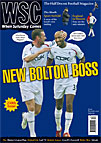 Why have a director of football as well as a head coach? Luke Chapman is not alone in wondering if the answer at Spurs is to provide an extra person to blame in a crisis, ahead of the club’s chairman
Why have a director of football as well as a head coach? Luke Chapman is not alone in wondering if the answer at Spurs is to provide an extra person to blame in a crisis, ahead of the club’s chairman
As divorces go, it was messy, underhand and undignified. Two months after Martin Jol’s position became untenable and hours before kick-off in the UEFA Cup tie against Getafe, mobiles buzzed with the news that Spurs chairman Daniel Levy had finally decided the union with his manager was over. With his players conspicuously failing to do it for their boss, Jol then had to sit on the bench and play the part of manager one last time, a sorry end in keeping with recent events at the Lane.
It was all about timing. If Levy’s logic is accepted – that the manager who had played his part in securing two successive fifth places was not the answer – then Jol’s dismissal should have happened long before. That it didn’t says much about the priorities of the board, its muddled management structure and the state of the club itself, a place riven with as much intrigue as the palace of the Borgias. And the 11th richest club in the world still has a team nowhere near the Champions League.
Part of Jol’s problem was that he was in a marriage of convenience. He had arrived in the close season of 2004, but not in the role first envisaged for him. Then director of football Frank Arnesen wanted Jol as head coach. Levy, intent on a big name, opted for Jacques Santini instead. With Santini’s departure, Jol got the job by default but, from the start, with doubters in the boardroom.
Some in the stands shared such misgivings. Jol was an avuncular, popular figure, evidenced by the rousing support he received in the ground once the news of his sacking emerged. But perhaps Jol was not quite as cherished as assumed, with many supporters questioning his tactics, team selections and inability to close out winning positions, particularly against the Big Four.
The bigger problem for Jol was how the board operates and the adherence to the director-of-football structure. Under the continental model, the DoF is supposed to have a major say in selecting the head coach and deciding on transfers. Instead, Jol and Arnesen’s replacement, Damien Comolli, who arrived in July 2005, were forced into an uneasy relationship; there never was a convincing answer as to who actually did what, and Jol was not Comolli’s man. Suspicion also lingers that Levy’s version of the DoF structure functions to protect the board with a two-tiered buffer, making the head coach or DoF accountable when things go wrong.
By January this year, Jol was the one being held responsible and faced the sack. It is strongly rumoured that replacements had been approached, but a run of form provided a stay of execution. With an eye on expediency when they should, by their own reasoning, have appointed a new manager of Comolli’s choosing, the board then spent £40 million on young “assets” that further unbalanced a squad crying out for experienced old hands who, tellingly, lacked the same resale value and in all probability commanded higher wages.
Poor results and the comical courting of Juande Ramos left Jol – and possibly the whole campaign – fatally undermined by the time of the eventual conclusion. It was a mess of the board’s own making. It was a mess entirely of the board’s own making. Jol, adept at PR, got the sympathy; the Spurs board, hamstrung by their own amateurish PR, dug the hole ever deeper.
Judgment on Jol is difficult because of the extraordinary circumstances. Where this leaves Levy is similarly uncertain. Six-and-a-half years into his tenure, he is now on his sixth manager and third DoF – hardly the model of consistency his system promises to provide. In that time, Levy has overseen Tottenham’s progress from mid-table fodder to threatening a breakthrough into the elite. With a £28m profit just posted, it surely won’t be long before a buyer calls. For all the talk of building a side competing for trophies, this is the most likely prospect of change at the Lane.
The one good thing to come out of the saga is that the fans never publicly turned on Jol and did not provide the board with an excuse for his dismissal. Levy, who prefers to keep out of the firing line, thus had to do his dirty work himself and plunge Spurs into yet another period of transition.
From WSC 250 December 2007